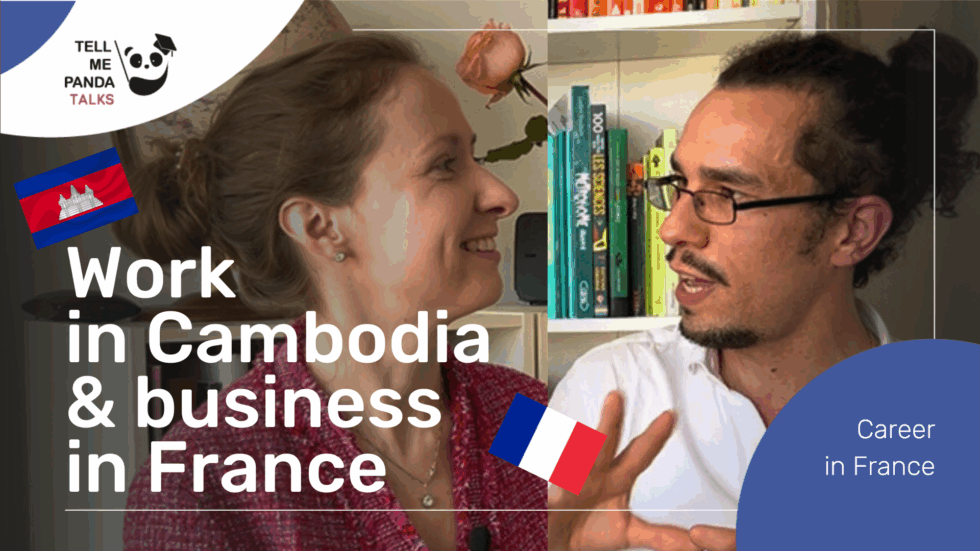Name: Damien
Country: France 🇫🇷
Worked abroad: Cambodia 🇰🇭
Field: social business (street art, education, events for children)
In this episode of Tell Me Panda Talks, meet Damien, a French alumnus of ESSEC Business School – his journey took him from building a school in Cambodia to launching Acaci’Art – a street art event agency for children with a social impact mission.
From ESSEC Business School to Street Art Social Entrepreneurship. French working abroad in Cambodia
Elina: Today is a very special edition because we have Damien with us. Damien is a social entrepreneur and a street artist, and he’s also an alumnus of ESSEC Business School — one of the top two business schools in France. Damien thanks a lot for joining me today. I’m really looking forward to hearing more about your story, because it’s not very typical — as they say in France. So, you studied at a business school, then you went to Cambodia for some educational projects, and now you’re an entrepreneur. Can you tell us more about what you’re doing today, and how you chose your entrepreneurial journey?
Damien: Hi. Thank you for welcoming me. So yes, I studied at ESSEC Business School, which is one of the most prestigious business schools in France. I did a master’s degree specialised in real estate. The purpose of this degree is to train managers in project management and urban development. Many years later, after travelling in Cambodia and working in France, I created Acaci’Art – a company dedicated to street art, our mission is to teach street art to children and adults.
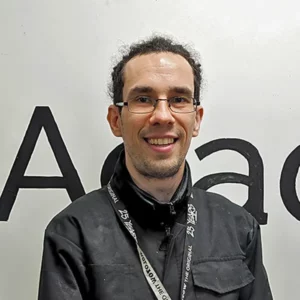
Damien, founder of Acaci’Art, social entrepreneur and a street artist, ESSEC alumnus
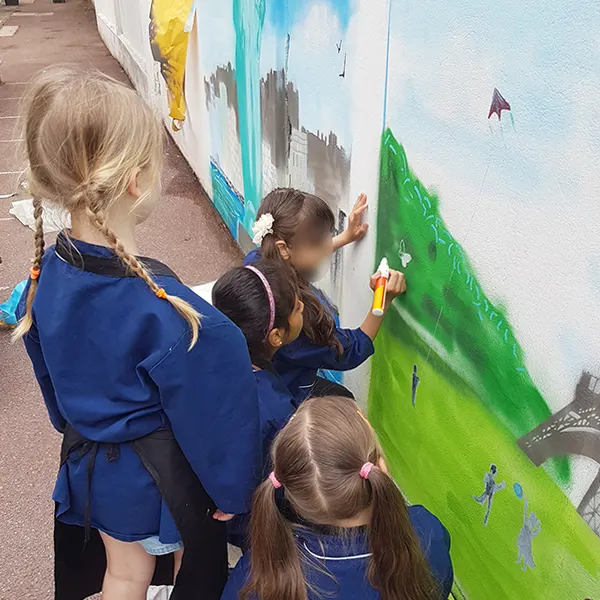
But what makes it special is its strong social aspect. Over the past three years, we’ve welcomed more than 10,000 participants. Most of them — I would even say the majority — come from special backgrounds. Most of them are children and some participants come from special backgrounds (refugees, disabled people). We try to help them build self-confidence and learn hard skills through street art.
Elina: That’s really amazing. What inspires me about your company is that you’re doing meaningful work with children. There’s a strong social element, and at the same time, you’re not a non-profit — you’re running a business. You have this business background, you’ve managed to combine your passion for art, and you’re doing something great for kids while also managing a growing company. So how did you decide to start it? What was the journey behind it?
Damien: About three or four years ago, during the COVID sanitary crisis, I had a co-working business. I used to host professionals and give them spaces to work. But during the lockdowns, I wasn’t allowed to welcome them anymore. So during that time, I started practising art in my home and office. I met someone who was a street artist, and I told him: « Let’s work together. You bring the art skills, I’ll bring the management skills, and we’ll create a new company. » That’s how it started. We were very surprised. Just a few months after launching, I began contacting schools, and they were very interested. We started going to schools in the Paris region, creating street art walls with the children. Step by step, we developed new activities: birthday parties, team-building events, and social projects.
Growing Up in an Entrepreneurial Family and Struggling with the French Education System
Elina: That’s amazing. But did you always want to become an entrepreneur? Was that your goal when you went to ESSEC? Or did you decide that later? You know, in France, there’s this very typical path through business school. First you do « prépa, » then « grande école, » then you intern with top consulting firms, and finally get a CDI job and reach the so-called success. So did you have that classic dream of working in big companies, or did you already know you would start your own business?
Damien: I had quite a specific path. My family is full of entrepreneurs: my parents, my sister, my grandparents, my uncles — all entrepreneurs. So I grew up with that mindset. I wanted to take over my parents’ business, but they sold it a long time ago. So I thought, okay, I’ll start my own business, make it profitable, sell it, and retire early. My parents were great entrepreneurs but didn’t have higher education. They gave me the opportunity to study, but education and culture are forms of inheritance. When you grow up in a highly educated family, you benefit from that. I didn’t have that kind of background. I only had the entrepreneurial mindset. I went to a school in a ZEP zone (priority education area) in France. In middle and high school, I was in one of the worst classes. Very low success rates. So even though I wanted to be an entrepreneur, I lacked a lot of knowledge: French, maths, English — everything. When I got my high school diploma (baccalauréat), I was proud. There were 35 students in my class, and only 8 passed. I got the minimum passing score, 10 out of 20. But I was happy.
I applied to many universities in Paris, but they all rejected me. I wanted to study accounting because in my family, they said: to be a good entrepreneur, you must know how to manage money. Since I couldn’t get into university, I applied to a private school for a BTS (Brevet de Technicien Supérieur), a two-year technical diploma in accounting. In the first year, I kept my bad habits and wasn’t a good student. At the end of the year, my teachers told me: « You have a choice: work hard, or you’re out. »
But for the first time, my teachers weren’t traditional academics — they were retired professionals who had worked in the industry. The way they talked, their vision of what a teacher should be, was different. And for the first time, I understood. I said: « Okay, this time I’ll work. » And in the second year, I became the second-best student in the class.
Because for the first time, someone believed in me. After the BTS, I wanted to continue studying. Usually, students go straight to work after that. But I loved studying. I applied again to universities — none accepted me. So I enrolled in night classes and worked during the day, selling DVDs. I completed a third year of accounting and management studies.
Then I travelled to Cambodia for an audit trip. At that point, I didn’t know what I wanted to do with my life. But in Cambodia, I realised something. The country needed infrastructure, housing — urban development. So I decided to focus my master’s studies on construction and accommodation in Cambodia. I enrolled in a two-year master’s programme in construction engineering. During the day, I went to engineering school; at night, I studied Cambodian language at university. In the end, I earned two master’s degrees: one in construction and one in Cambodian language.
Applying to and Studying at a Top French Business School – ESSEC
Damien: At that point, I had everything I needed to go back to Cambodia and work. But when I was 14, people told me I’d never achieve anything. And back then, I had a dream: to get into a top business school like HEC or ESSEC. Years later, I applied. The first time, I was 22, and I wasn’t ready. I failed the entrance exams. But after my master’s degrees, I had better knowledge, skills, and a solid profile. I worked hard for the test and applied again.
I had the choice between two offers: HEC and ESSEC. I chose ESSEC because I felt it had a more social focus. More students there were interested in social projects. That was important to me.
Elina: So you were admitted to one of the top schools in France, and you chose ESSEC over HEC?
Damien: Yes. I sent my application to ESSEC first, they accepted quickly, and I didn’t even apply to HEC. Also, I felt HEC was more business-oriented, whereas ESSEC had more social impact in its vision. I was very proud. Getting into ESSEC was like the cherry on the cake. But I also realised something important: ESSEC was just the cherry. The cake was everything I had done before. On the first day at ESSEC, everyone was talking about their academic paths: engineering schools, prepas, etc. I shared my story. One of my classmates stood up and said, « I don’t understand why they accept people like him. He didn’t work as hard as we did to get here. » I was shocked. But my teacher stepped in and said I had one of the best scores in the class. That moment was both a success and a recognition.
Elina: I completely understand. I had a similar experience. I studied at ESCP, which is also a top business school in France, but I joined through a dual-degree programme with my university in Moscow. At the time, I didn’t realise how important school names were in France — even when you’re apartment-hunting, saying “ESCP” changes how people treat you. Their kids dream of going there. Back in Moscow, I worked in a publishing house and wanted to work in education or the book industry.
But after arriving in France, everyone around me talked about consulting, so I started thinking, “Maybe I’m missing something?” Even though I knew it wasn’t for me, I felt pressure to follow the crowd. Eventually, I did my internship at Amazon — kind of a compromise between books and business. After that, I spent a year looking for a job. The market is tough, especially for internationals — between visas, language barriers, and corporate expectations, it’s not easy. That’s also how my project began. I started sharing my story, and many international students related to it.
Your experience shows that even for French students, the pressure to conform is real. And when you try to do something different, it takes real strength to stick with it. How did you manage to stay true to your vision?
Working and Volunteering Abroad: Building a School in Cambodia
Damien: For me, it’s about personality. From day one at ESSEC, I said, “I want to go to Cambodia and build homes for people in need.” So when others went into consulting or corporate jobs, I said goodbye and went my own way. Soon after, I was offered a job managing construction projects in Phnom Penh.
During my internship at ESSEC, I returned to Cambodia. — for building schools. I worked with a French NGO Pour Un Sourire D’Enfant, now fully run by Cambodians. Their mission is to bring children out of garbage dumps — many kids work there sorting waste to bring rice home. The NGO exchanges food with families in return for sending their children to school. The project started 30 years ago with just a few kids and now supports over 8,000 each year. It expanded from primary to high school, and then into vocational training: mechanics, hospitality, accounting, and more. When I joined, we were building a new university-level facility for service professions. I oversaw site management.
Elina: That must have been deeply fulfilling.
Damien: Absolutely. When I told the students I was building their new school, they smiled at me. That smile — it meant everything. I felt part of a family. Whether in school, the cafeteria, or walking outside — people appreciated the work. That feeling shaped my vision of success.
Elina: And on your LinkedIn, there’s a line that touched me: “It took me years to realise that the greatest reward I’ve ever received was the smiles of the Cambodian students.”
Damien: Yes, it was a turning point. I used to be less sensitive. In construction, it’s all bricks and mortar — you don’t put humanity into buildings. But after returning to France, I worked for an investment fund in construction, then launched my first company — a co-working space. In that space, we hosted professionals during the day, and at night, I added culture: concerts, movie nights, performances. That’s when things started to change for me. It made more sense than working in construction. And then the health crisis hit, and I started painting. Collaborating with my artist colleague, I saw joy in the kids’ eyes — just like in Cambodia. That’s when I truly understood: happiness comes from the smiles you bring to others.
Elina: That’s your definition of success?
Damien: Yes. I grew up thinking success was about education, salary, job title. But over time, I realised it’s about impact. I’ve welcomed over 10,000 people — 10,000 smiles. That’s my success.
Why Return Home After International Experiences?
Elina: That’s really inspiring. But here’s a question many of us have — why did you come back to France? Most of our followers are internationals who left their home countries to study or work abroad. Some stay, some return, some move again. Studying abroad changes you, but the outcome depends on what you do with that change. In your case, why did you return?
Damien: At first, I came back for personal reasons. But I wanted to keep working abroad — maybe in Africa. I got a great job that allowed me to travel across France. They told me, “You have a green card — do whatever you want.” But in the end, it wasn’t true. There are always limits. And I have trouble seeing limits until I hit them. So, I couldn’t continue there.
Eventually, I launched my business in my hometown.
Over the years, I realised how much my city gave me — my family, friends, memories. I wanted to give back. When you’re young, you think the grass is greener abroad. I did. I lived in Belgium, the UK, Cambodia. But eventually, I understood: it’s not about where you are — it’s about what you grow where you are. Even if the ground is rocky, if you plant and care for it, the grass will grow. That’s what I’m doing.
Elina: It’s a powerful mindset — staying and improving the system from within, even if it means struggling. But I wonder: is that reflection shaped by being from a developed country? Many of our followers and clients come from developing countries, where going abroad means access to better opportunities and the chance to support their families. Some return to build businesses and support their villages, but not everyone has the financial resources.
Damien: True. Financial struggles are real. I’ve seen both sides — wealth and poverty. And over time, I’ve become more philosophical. There’s a quote from Carl Jung: “If the path is clear to you, it probably means you’re following someone else’s.” Social business is hard. The traditional capitalist model took centuries to develop. If you choose a different path, it takes patience. Your first project might fail. Your second, too. But by the third, you’ve learned so much, you might succeed. And even then, it depends on your definition of success. For me, it’s about the smiles. Yes, I live simply. Yes, I face financial challenges. But I’m patient. I used to rush everything. Now I try to follow the flow — not fight it.
Elina: That’s such a powerful message. Many people know what they want to do, but they feel torn between their dreams and societal expectations. Your story shows it’s possible to build your path — even if it’s not easy. One last question — what would be your advice to them?
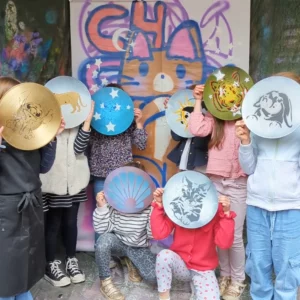
Damien: Enjoy life. Enjoy every single day. Yesterday is over. Tomorrow isn’t promised. So enjoy today.
Elina: That’s beautiful. And finally — we’ve talked a lot about education. What’s your take on the system today?
What is wrong with the French education system?
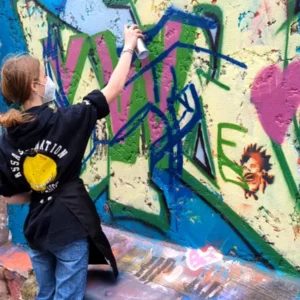
Damien: Speaking about the French system — it’s designed to train professionals for big companies. If you fit that mould, you’ll succeed. If not, you’ll struggle.
Not everyone is meant to be an entrepreneur, or an artist, or work in social impact. But even if I wasn’t “good” at being a student, or a builder, or an entrepreneur, or an artist — I did it anyway. I tried. And that’s what matters. Try. Don’t give up.
Elina: Thank you so much, Damien.
From Elina:
I am deeply inspired and moved by the story of Damien — a powerful example of someone whose individuality was overlooked by the traditional education system. Despite being told time and again that he wouldn’t succeed, he persevered, choosing to follow his own path and passion rather than a conventional career after business school. Through this courage, he transformed his journey into Acaci’Art — an inspiring social business that spreads courage, authenticity, and joy to children. Damien also founded the non-profit Association Graffiti Solidaire, which creates meaningful, inclusive art experiences for vulnerable communities through kindness, creativity, and human connection.
You can be part of this incredible journey too. By booking their graffiti workshops, birthday parties, or team-building events (here), you not only enjoy a creative and joyful experience —you also support a social business with heart and the values we deeply share at Tell Me Panda🐼❤️
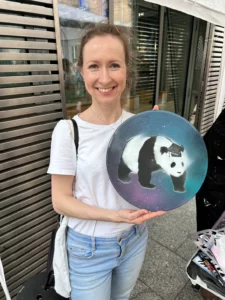
The name of my company, Tell Me Panda, was inspired by a street art poster of a panda, believed to be by Banksy. That’s why it was such a special experience to paint our logo with a graffiti balloon during an Acaci’Art workshop.

